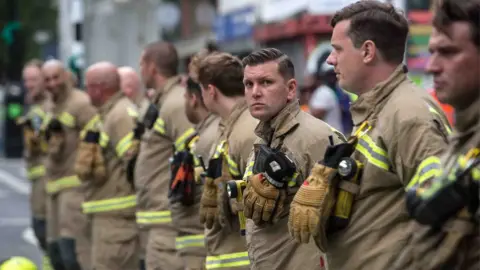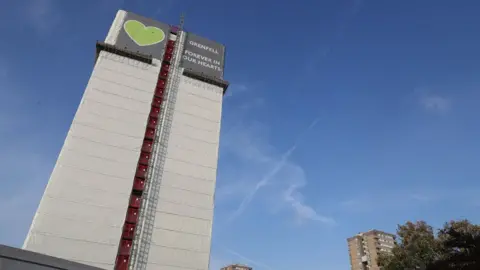Grenfell Tower Inquiry: Escape plans needed to avoid next disaster - union
 Getty Images
Getty ImagesThere was an "unjustified reliance" on firefighters to evacuate Grenfell Tower on the night of the fatal fire, a union has told the inquiry into the disaster.
The Fire Brigades Union said building owners and managers should draw up evacuation plans to prevent future catastrophes.
Union lawyer Martin Seaward said there was a "near total failure" of fire safety measures at Grenfell Tower.
The June 2017 disaster at the west London tower block killed 72 people.
The comments came on the final day of closing statements in a section of the inquiry focusing on the fire safety measures in the building, its management, risk assessment and the communication with residents.
Mr Seaward criticised the approach to fire safety taken by the Kensington and Chelsea Tenant Management Organisation (KCTMO).
He told the inquiry on Tuesday the "hazardous rainscreen cladding system" should have been identified as a risk and removed by April 2016.
"Additionally, the near total failure of all the active and passive fire safety measures allowed the rapid deterioration of conditions inside the tower, which grossly impeded the firefighters' operations, including search and rescue," Mr Seaward said.
 PA Media
PA MediaMr Seaward added if the fire risk management system from the tenant management organisation had worked "most, if not all" of the people who died would have been saved.
The lawyer argued to the inquiry the safety plans were characterised by an "unjustified reliance" on the London Fire Brigade to evacuate residents, "including those especially at risk in the event of fire in Grenfell tower".
Mr Seaward said: "Of course, the fire and rescue service will attend and do its best at any fire or other emergency, but fire safety depends on everyone doing their bit.
"That very much includes responsible persons developing and practising building-specific evacuation plans for residents, including personal emergency evacuation plans for those especially at risk, in the same way that employers do in office blocks or factories."
'Culture of failings'
Anne Studd QC, representing London Mayor Sadiq Khan, told the inquiry the tenant management organisation did "very little" to see if Grenfell was suitable for the stay put strategy in its fire assessments and Royal Borough of Kensington and Chelsea Council (RBKC) had limited oversight of them.
"The evidence before you, Mr Chairman, has demonstrated a culture of failings in transparency and candour by the KCTMO, which, coupled with a lack of intrusion from RBKC, was a toxic combination," she said.
James Maxwell-Scott QC, representing the council, told the inquiry it "apologised unreservedly" again for council failings before the disaster.
The failings included the number of council officers devoted to monitoring the KCTMO being "insufficient" and its housing commissioning team not making enough use of the corporate health and safety team's expertise to "prevent issues falling between the gaps," he said.
The lawyer added the KCTMO was an independent, managing agent of Grenfell Tower which was at an "arm's length" from the council, which was the building's landlord.
"The council fully admits that it retained some control over the tower, and therefore continued to have some responsibilities for it under the Fire Safety Order. But those responsibilities are better described as residual ones than shared primary ones," he told the inquiry.
